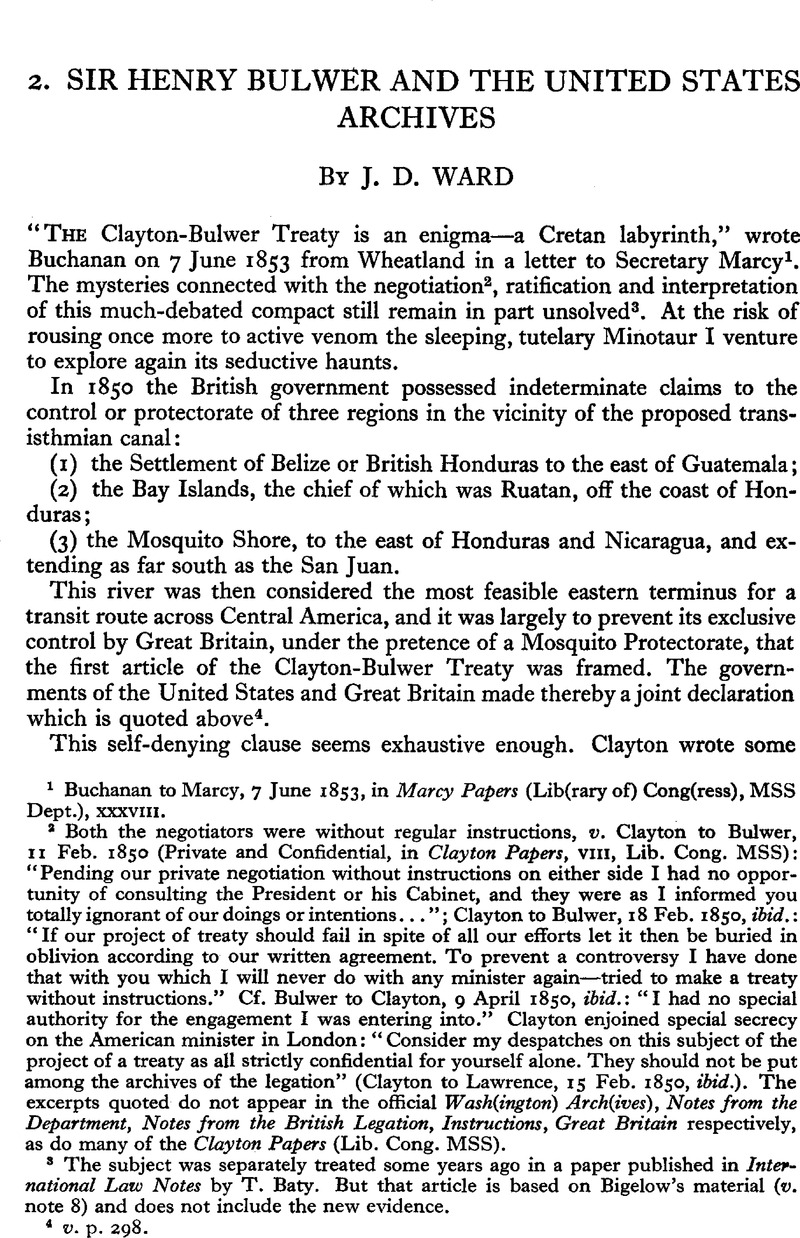Published online by Cambridge University Press: 20 December 2011

1 Buchanan to Marcy, 7 June 1853, in Marcy Papers (Lib(rary of) Cong(ress), MSS Dept.), XXXVIII.
2 Both the negotiators were without regular instructions, v. Clayton to Bulwer, 11 Feb. 1850 (Private and Confidential, in Clayton Papers, VIII, Lib. Cong. MSS): “Pending our private negotiation without instructions on either side I had no opportunity of consulting the President or his Cabinet, and they were as I informed you totally ignorant of our doings or intentions…”; Clayton to Bulwer, 18 Feb. 1850, ibid.: “If our project of treaty should fail in spite of all our efforts let it then be buried in oblivion according to our written agreement. To prevent a controversy I have done that with you which I will never do with any minister again—tried to make a treaty without instructions.” Cf. Bulwer to Clayton, 9 April 1850, ibid.: “I had no special authority for the engagement I was entering into.” Clayton enjoined special secrecy on the American minister in London: “Consider my despatches on this subject of the project of a treaty as all strictly confidential for yourself alone. They should not be put among the archives of the legation” (Clayton to Lawrence, 15 Feb. 1850, ibid.). The excerpts quoted do not appear in the official Wash(ington) Arch(ives), Notes from the Department, Notes from the British Legation, Instructions, Great Britain respectively, as do many of the Clayton Papers (Lib. Cong. MSS).
3 The subject was separately treated some years ago in a paper published in International Law Notes by T. Baty. But that article is based on Bigelow's material (v. note 8) and does not include the new evidence.
4 v. p. 298.
5 Clayton to Marcy, 11 June 1853, in. Marcy Papers (Lib. Cong. MSS) XXXVIII.
6 v. Bulwer to Palmerston, 6 August 1850: “The usual acceptation given to it (the term ‘Central America’) would simply embrace the five States, viz. Honduras, Guatemala, Salvador, Nicaragua, and Costa Rica, which formerly constituted the Central American Republic” (Brit. Parl. Pap. 1856, LX, 66).
7 de Martens, Nouveau Recueil, etc., XV, 194, who entitles it “Note finale du négociateur anglais.”
8 J. Bigelow, Breaches of Anglo-American Treaties, chap, v, who treats it throughout as a “bogus letter” (p. 124); M. W. Williams, in American Secretaries of State, VI, who thinks that Clayton accepted it but concealed the fact “by not filing it with the other papers connected with the negotiation” (p. 69). v. also note 3.
9 Clayton (unsigned) to Marcy, 21 May 1856, begins in Clayton Papers (Lib. Cong. MSS), XI, 2199; continued in ibid., VII, 1417. I did not find this letter in the voluminous Marcy Papers (Lib. Cong. MSS). Perhaps it was never sent. But in view of the fact that Clayton not only wrote the letter, but also secured from Fisher a letter of confirmation (which appears in the Clayton Papers), he must be held responsible. Within six months Clayton was dead.
10 Brit. Parl. Pap. 1856, LX, 64.Google Scholar
11 Brit. Parl. Pap. 1856, LX, 60.Google Scholar
12 Brit. Parl. Pap. 1856, LX, 60.Google Scholar
13 Wash. Arch., Notes from Department of State to Great Britain, VII. Printed in Senate Document No. 12, 32 Congress, 2nd session (Serial no. 660), 2–3.
14 Brit. Part. Pap. 1856, LX, 63.Google Scholar
15 Clayton to Marcy, 21 May 1856, in Clayton Papers (Lib. Cong. MSS).
16 Clayton to Marcy, 21 May 1856, in Clayton Papers (Lib. Cong. MSS).
17 Clayton to Marcy, 21 May 1856, in Clayton Papers (Lib. Cong. MSS).
18 Fisher to Clayton, 21 May 1856, in Clayton Papers, II (Lib. Cong. MSS).
19 So I was assured by the oldest memory in the State Department; and ordinary accuracy and business efficiency would naturally demand it.
20 Wash. Arch., Index to the Corresp. with the Brit. Legation, LIX, 94.
21 Wash. Arch., Notes from Dept. to Gt. Brit, VII (1844–1857), 251–54.Google Scholar
22 Wash. Arch., Notes to Dept. from Brit. Legation, XXVII. It was then customary, though by no means universal, for the receiving clerk to write a short summary on the back of each communication, for convenience of reference (especially useful with despatches in another language). This was before the days of a separate despatch for each separate topic, though Everett claims to have adopted this reform in his correspondence as Minister to England, 1841–45. [Everett to Clayton, 6 April 1849, private, in Clayton Papers, IV (Lib. Cong. MSS).]
23 Clayton to Bulwer, 17 July 1850, in Clayton Papers, IX (Lib. Cong. MSS; not in Wash. Arch., Notes from Dept.).
24 Squier to Clayton, 2 Sept. 1850, in Clayton Papers, IX (Lib. Cong. MSS).
25 Clayton to Marcy (private and confidential), 4 June 1853, in Marcy Papers, XXXVIII (Lib. Cong. MSS).
26 Clayton to Marcy (private and confidential), 4 June 1853, in Marcy Papers, XXXVIII (Lib. Cong. MSS).
27 Bulwer to Webster, 17 August 1850, Wash. Arch., Notes to Dept. from Brit. Legation, XXVII.
28 Bulwer to Webster, 17 Aug. 1850, Wash. Arch., Notes to Dept.from Brit. Legation, XXVII.
29 Dict. Nat. Biog. (ed. 1886), VII, 264.
30 For this episode, v. an article in the Revue des Deux Mondes for April 1849, pp. 823–845, which, perhaps with a view to informing himself as to the professional methods of his antagonist, Clayton caused to be translated by a clerk in the State Department.
31 Bulwer to Clayton, 9 April 1850, in Clayton Papers, VIII (Lib. Cong. MSS).
32 Professor Temperley has kindly drawn my attention to the career of Bulwer when minister at Constantinople. The evidence shows that Bulwer's methods, though sometimes brilliant, were often of a really questionable character. Professor Temperley thinks that this characterisation specially applies to the circumstances under which Lord Russell recalled Bulwer from Constantinople in 1865. Brit. Museum, Add. MSS 39,116, ff. 118–20, 41,820.
33 In F.O. 5/513. Palmerston to Addington, 10 August; Addington to Palmerston, 13 August; Palmerston to Addington, 13 August.
34 F.O. 5/514, No. 157.